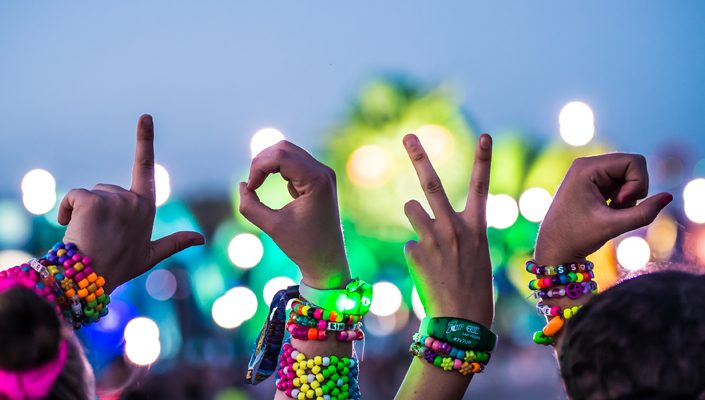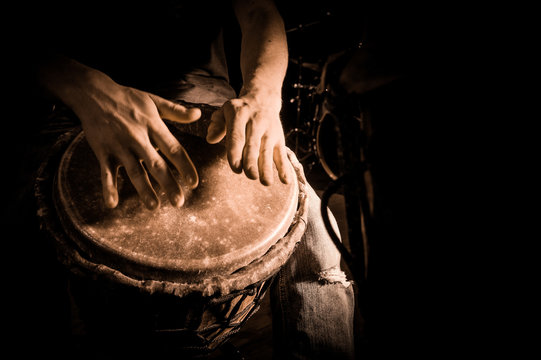
A study conducted by the University of Kent explores the nature of a rave and its effects on human behavior and emotional states. The study demonstrates that individuals who engage in raves open themselves up to awe and transformation. The rave is considered a “liminal” space that allows one to disengage from the normal modes of societal operation and explore new perspectives outside of the ego. As a result, ravers will create “identity fusion” with their cohorts, and promote prosocial bonds in the future.
For the purposes of this study, a rave is considered to be a liminal event held in a group setting where people are engaging in the 4Ds of altered states: Dance, Drugs, Drums, and Sleep Deprivation. The common element here is their ability to help individuals dissociate from their normal lives and lose themself in the music.
Dancing has been around since tribes learned to bang bones together to make sounds. It fills the void of formal structure, and intrinsically stimulates a holistic total body movement. There is an idea of “flow”, pure freedom, and loss of identity that can occur when one loses themselves in movement. And all that exercise is also associated with the production of endorphins and dopamine release (think runners high).
Drums and rhythm also play an element. Music is considered medicine in many cultures and there are many music therapies emerging now in the western world. Music and rhythm are learned. As a song plays you come to expect a beat to drop, or a chorus line to play. And when expectations are met with reality, cortisol levels go down and your dopamine levels go up. This all plays into that euphoric feeling bringing a raver closer to “Awe”.

Sleep Deprivation is another element, as raves usually occur at hours well outside of the normal sleeping regimen. Lack of sleep and odd hours can play into the liminality of a space. It can get a raver outside of their normal mode of operation. Furthermore, sleep deprivation can be considered an altered state. Inhibitions can shift, and more ego dissociation can occur.
Drugs, specifically psychedelic drugs, are perhaps the hardest element for the general public to get behind. In the 1960s the US Government pointed attacks and smear campaigns on Timothy Leary and the psychological benefits of certain drugs. There are entire generations of aging people who believe that these substances are the devil manifest to take ice cream scoops out of your brain. These same substances have been used by indigenous tribes for centuries to manifest God and find enlightenment.
New studies suggest that, if dosed properly, psychedelic drugs can enhance experiences, assist with ego dissociation, and enhance meaningful experiences to create better bonds with others. They can help with depression, post-traumatic stress disorder, and even dysmorphia and eating disorders.
Dr. Martha Newson, the author of the study, also discussed the negative connotations that rave culture has come to possess among the general public.
“Undoing the negative connotations associated with rave culture is a big challenge, but this research shows there are indeed social and behavioural benefits that ravers gain from the experience. Our need to connect meaningfully with others will always prevail – whether it’s singing in choir at church or stomping to electronic music in a dis-used warehouse.”
The study found that people who identified as more “Open” were more likely to experience wonderment, and were more mutable to transformation than others in the study. Interestingly, men were significantly more likely than women to self-identify as “Open.” However, all those who did identify as “Open” had the same feelings of transformation, regardless of sex. This would then lead to greater feelings of bonding afterward. Or as the study stated, “Identity fusion.”
This concept of identity fusion is nothing new. Women who go through childbirth often describe a shared experience and bonding with the global community of mothers. People who pledge fraternities, or sports teams who go through rigorous exercise and travel regimens also experience bond creation. Health care workers who work long and wacky hours depriving them of sleep also go through this. The common thread here is the dissociation of the self to the shared experience of the group.
There are implications that these effects tend to lead to prosocial behaviors in individuals who experience them. This means they are more likely to be charitable, generous, and empathetic the those around them after an awe-inspiring transformative event.
You don’t necessarily need to be at a rave to experience this. The goal here is to dissociate from the ego, detach from the rigamarole of your daily routine, and engage in a group that is greater than yourself. The 4Ds can help get you there, and there are a growing wealth of clinical therapies proving these are positive and beneficial methods for self-betterment. But the biggest thing you must overcome is the fear surrounding letting go of yourself. Keep on dancing.